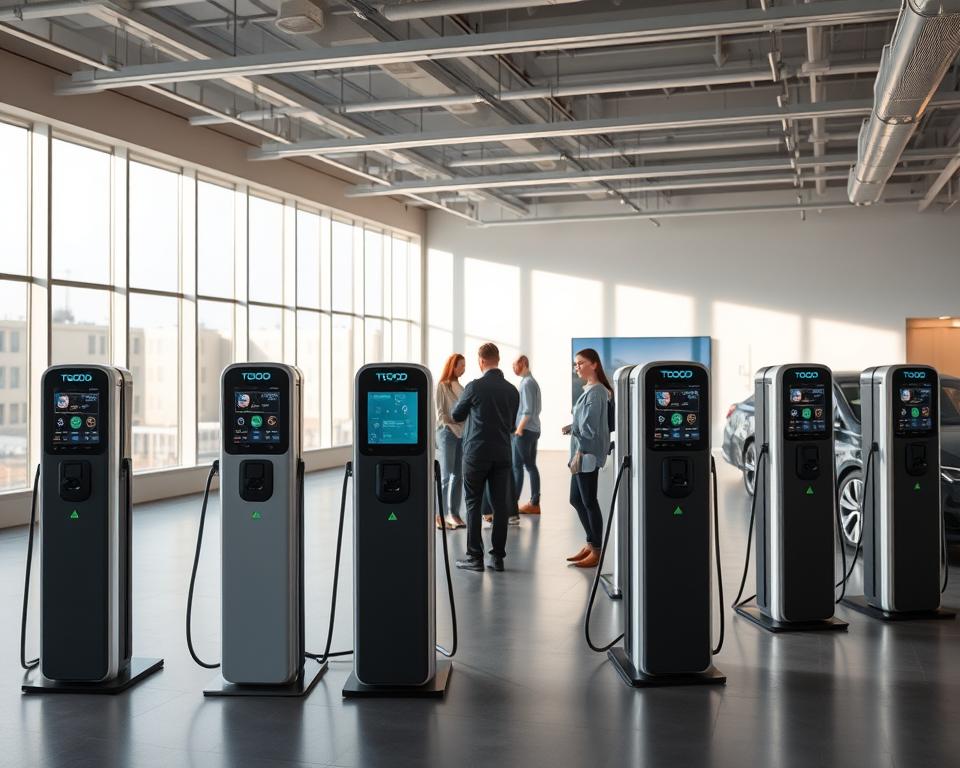Leading EV Charging Cable Manufacturers for Your Electric Vehicle
The electric vehicle industry is on the rise, with the demand for trustworthy and efficient charging solutions increasing sharply. Currently, leading companies have been at the cutting edge of this change, providing high-quality charging infrastructure. Southwire, for instance, has been a significant player since 2014, garnering 1000+ five-star reviews and 75 years of experience in the electrical construction industry.
The upswing in electric vehicle adoption drives demand for durable, quick, and reliable EV Charger Manufacturers. Top manufacturers are pioneering to address changing requirements, offering solutions that boost the overall charging experience.
Grasping the distinctions between various charging solutions is crucial for selecting wisely. High-grade charging infrastructure directly influences vehicle performance and user experience.
Critical Findings
- Top manufacturers offer high-quality charging cables for improved durability and safety.
- EV market expansion drives need for high-efficiency chargers.
- Top brands pioneer solutions for changing EV requirements.
- High-grade cables improve energy transfer and driving range.
- Buying premium chargers pays off over time.

Why High-Quality EV Cables Matter
As electric vehicles become increasingly popular, the value of high-quality EV charging cables is undeniable. The performance, security, and reliability of electric vehicle charging systems hinge upon the quality of the charging cables used.
How EV Charging Tech Has Advanced
Charging tech for EVs has evolved rapidly, with a priority on faster charging speeds and improved safety features. Modern EV charging cables are built for these requirements, featuring high-grade materials and advanced designs to minimize energy waste and maximize charging efficiency.
Why Quality Matters in EV Charging Infrastructure
Quality charging cables directly impact the overall performance and safety of EV charging infrastructure. Durable features, such as weather resistance and temperature tolerance, ensure reliable operation across various environments. Moreover, meeting standards and following protocols are crucial in guaranteeing safe operation.
| Key Features | Benefits |
|---|---|
| Superior materials and construction | Minimized power loss during energy transfer |
| Robust durability | Weather resistance, flexibility in extreme temperatures |
| Standards adherence | Rigorous safety requirements met |
| Maintainability | Repairable design for longevity |
Our high-performance cable solutions, such as those offered by Aichie Tech Electronics, are tested for quality and compliance in The Cable Lab. By opting for serviceable Portable EV Charger, owners save money long-term through repairs, lowering environmental impact.
China’s Leading EV Cable Makers
A surge of cable makers in China supports the EV boom. They play a key role in global EV infrastructure, providing high-quality automotive cables designed for different applications.
Wottz – Top EV Cable Maker from 2014
Wottz has been a leading cable manufacturer since 2014. They offer a range of cables that meet the specific requirements of EV charging systems, from Mode 1, 2, 3, and DC Fast Charging (Mode 4).
Aichie Tech Electronics – 75 Years in Electrical Solutions
Aichie Tech Electronics leverages 75 years of electrical expertise in its EV cables. Their products are built for residential and commercial applications.
Additional Key Cable Suppliers
Companies developing flexible, weather-resistant and high-performance cables are also notable. These include Type 1 & 2 connector experts, as well as brands innovating in cable durability and adaptability.
A Guide to EV Cable Types
As electric vehicles become increasingly popular, understanding the various types of EV Charging Cable Manufacturers is crucial for optimal charging experiences. Different cables suit different charging needs. The diversity in EV charging infrastructure necessitates a closer look at the different cable types available.
Type 1 vs Type 2 Explained
SAE J1772 (Type 1) and Mennekes (Type 2) are the main global standards. Type 1, also known as SAE J1772, is predominantly used in North America, while Type 2, or Mennekes, is the European norm. The choice between these cables depends on the vehicle’s connector type and the charging station’s compatibility. Type 2 cables often handle greater power, making them ideal for speed.
Level2 and DC Fast Charging Solutions
Level2 charging cables offer faster charging than Level1, using 240V AC power to deliver up to 19.2 kW of power. DC Fast Charging cables, on the other hand, provide rapid charging by converting AC power to DC within the charging station, allowing for much faster charging times. These cables are key for highway charging, letting EVs charge in minutes.
Portable and Tethered Cable Options
Granny chargers plug into home outlets for emergency use. Tethered cables are fixed to charging stations, offering ease at the cost of portability. The choice depends on the owner’s charging needs and preferences.
When selecting an EV charging cable, factors such as cable length, charging speed, and compatibility with the vehicle are crucial. For instance, portable charging cables range from simple L1 cords to full L2 kits. Vehicle-to-load (V2L) cables let EVs act as mobile power banks.
- Flexible granny chargers and L2 units suit various needs.
- Tethered cables are permanently attached to charging stations, limiting flexibility but eliminating the need for personal cables.
- Cable length is a critical consideration, with options ranging from 5-meter standard cables to 50-meter extended cables.
Key Features of High-Quality EV Charging Cables
High-quality EV charging cables are distinguished by several key features that ensure reliable and safe charging. These features are crucial for maintaining the integrity of the charging process and safeguarding the vehicle and user.
Durability and Weather Resistance
Durability and weather resistance are paramount in EV charging cables. Manufacturers like Wottz and Southwire craft their cables from recyclable materials that adhere to ROHS compliance, ensuring they withstand various environmental conditions. Their serviceable design facilitates easy maintenance and promotes recycling.
Flexibility and Ease of Use
Cables need to flex yet remain tough. High-quality EV charging cables are built for easy handling without sacrificing strength. This flexibility is combined with rugged construction for lasting performance.
Certified Safety and Standards
Approved safety marks ensure reliable performance. They ensure their products meet or exceed standards such as IEC62196 for connectors and UL2594 in North America. Independent labs verify safety, toughness, and weatherproofing.
| Certification | Description | Region |
|---|---|---|
| IEC62196 | Connector safety standards | International |
| UL2594 | Standard for electric vehicle supply equipment | North America |
| ROHS | Restriction of hazardous substances | International |
Emphasizing these attributes yields cables that are safe, durable, and user-friendly.
Next-Gen Charging Cable Tech
The latest developments in EV charging cable technology are revolutionizing the way we charge our vehicles, with a focus on ultra-fast charging, improved signal integrity, and eco-friendly materials.
Thermal-Managed Fast Charging
Cooling fluids enable higher charge rates, minimizing thermal throttling during high-power sessions.
Hyperboloid Contacts and Enhanced Signal Integrity
Hyperboloid contacts are being integrated into EV charging cables to enhance signal integrity, ensuring stable communication and power flow.
Eco-Friendly Cable Compounds
Companies focus on green materials, using recyclable materials and eco-friendly compounds that reduce environmental impact. For instance, companies like Aichie Tech Electronics and Wottz are adopting serviceable design philosophies and RoHS compliance to minimize waste and promote recycling.
Programs for cable recycling, non-toxic compounds, and TPU sheaths mark the eco shift.
How to Select the Right EV Charging Cable for Your Vehicle
Selecting the proper cable ensures optimal performance. To make an informed decision, consider several key factors.
Connector Compatibility
Ensure the charging cable is compatible with your vehicle’s connector type. Your vehicle’s onboard charger capacity determines the maximum AC charging rate it can accept.
Picking the Right Cable Length
Choose a cable length that suits your charging needs. A longer cable adds reach at the cost of extra weight.
Considering Power Requirements and Charging Speed
Ensure cable amperage aligns with charger and car. Standard Level 2 home charging operates at 7.2 kW, but some vehicles support up to 19.2 kW with appropriate electrical service.
Mind these points to pick a cable that fits your EV lifestyle.
Conclusion: Investing in Quality EV Charging Infrastructure
As the electric vehicle market continues to expand, the importance of quality charging infrastructure cannot be overstated. Investing in premium EV charging cables from established manufacturers like Wottz and Aichie Tech Electronics ensures superior durability and lower lifetime costs. Their serviceable designs enable repairs over replacements to cut waste. This approach aligns with the core values of electric vehicle ownership by promoting sustainability.
Premium cables offer certification, future proofing, and reliability.


